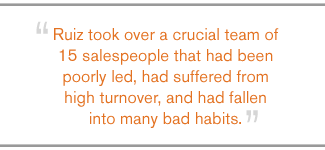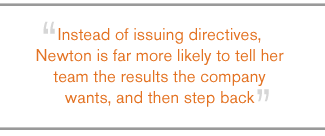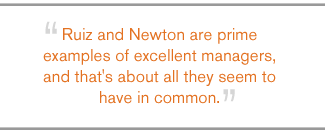Some Buddhists believe that there are many paths to enlightenment, as many paths as there are seekers. Business philosophy, however, considers that idea problematic. Business leaders don't want many paths to enlightenment, or in their case, to business results like employee engagement and the benefits it brings. They want one simple, straight, predictable path.
 |
When it comes to employee engagement, though, Buddhist thought is probably closer to the truth. There isn't a perfect path to engagement, a single route that passes from manager to employee to performance to productivity to profit. There are as many effective ways to manage people to attain high performance as there are great managers -- and if you want proof, just ask Jennifer Schulte.
The mysterious managers
Schulte is the global project manager for associate engagement at Mars, Incorporated, the $18 billion food and beverage company. Everything about the process of managing the engagement of 33,000 associates falls under her purview: She works on ways to embed engagement into business processes and coaches managers on best practices in promoting it. She measures employee engagement at Mars using Gallup's 12-item employee engagement survey, the Q12, and period by period, she analyzes the results. (See "Feedback for Real" in the "See Also" area on this page.)
As Schulte examined the numbers for the past couple of years, it seemed like some of Mars' managers just couldn't fail. These managers came from several departments -- from HR to sales -- yet their results were similarly spectacular. Their teams' engagement levels were near or above the 75th percentile year after year, making them about or more engaged than three-quarters of the work units Gallup has ever studied. Their team performance was uniformly outstanding, and the teams were highly profitable. On every metric, these managers were exceptional and consistent.
On to something
Schulte started wondering about the magic these managers seemed to have and whether she could replicate it. The data gave no indication of how those managers attained their results, and she knew enough about them to know the key wouldn't be found in lists of numbers.
But they were obviously onto something, and Schulte wanted Mars' other managers to get some of it, too. "Why not harness the power of whatever it is they seem to just naturally do?" she says. "We could use it to show struggling managers that it's not hard; it's all the little things managers do that add up to making sure teams are more engaged."
Schulte called together 20 of the best frontline managers from each of Mars' major global geographical areas. She asked them precisely what they did to get such high and consistent results, and their responses were identical. "They all said, 'It's the team.' None of them think they do anything at all," says Schulte. "All twenty of them said they simply enable the team [members] to do their best."
And that, Schulte soon realized, is exactly what they had in common. Two of those managers, Carlos Ruiz and Jo Newton, are excellent examples of the power Schulte wants to harness.
Carlos' way
Ruiz is a district sales manager in Bayamón, Puerto Rico. He'd been with Mars for 10 years in several positions but only managed salespeople (and only three of those) for two years. Puerto Rico, however, was Mars' largest and oldest market in that part of the world, and the manager he replaced was, as Ruiz puts it, "abusive." So as a green manager, he took over a crucial team of 15 salespeople that had been poorly led, had suffered from high turnover, and had fallen into many bad habits.
"But I'm a quick learner; that's what I told my boss when he hired me from accounting," says Ruiz. It's a good thing he was -- he had a lot to learn, and so did his team. The first lesson was to trust Ruiz. "They had no trust in their direct boss before me, and here I come," he says. "I was new, younger, and of course knew less about sales than they did."
He started by going on calls with every team member, asking each to introduce him as a coworker, not the boss. He put four people on probation for bad behavior, then fired two of them. (One of the salespeople he placed on probation later became salesperson of the year for the district.) He instituted rules that were fair, consistently applied, and tied to performance metrics. He modeled high ethical standards.
"Earning their trust was the only way that I could communicate with them," says Ruiz, "I wasn't all that experienced in sales, so I needed to learn from them. And it wasn't going to happen unless they trusted me."
A natural teacher
It took two years, but the team began to see Ruiz as a capable, trustworthy, and reliable leader. What they also learned was that he was born to teach. Ruiz earned his CPA and MBA while working full time at Mars, and he felt his business experience was invaluable to him and his sales team.
 |
First, he explained to his salespeople that they weren't selling boxes of candy bars -- they were each running their own million-dollar business. "All of a sudden, their attitude towards their job [became], 'I'm valued here; I have a million-dollar business to take care of.' That gave them a great motivation to get out of bed early to go manage that business," says Ruiz.
But Ruiz got up even earlier. He taught his team how to negotiate, give public presentations, establish quotas, work on margins, conduct and measure the impact of promotions and rebates, smooth business fluctuations, and evaluate year-on-year performance by customer and category. He taught and tested them on P&L, marketing concepts, objection management, and basic and applied math. He changed their performance metrics to reflect dollar amounts, not the number of boxes they moved. He badgered them to take advantage of Mars' tuition reimbursement program and go to college as he had.
"I didn't challenge mistakes, I challenged their thought process," says Ruiz. "I wanted to raise their professional level so that they could have a job five years down the road. It was the only way."
His team of languishing salespeople became highly motivated and successful entrepreneurs. Ruiz did all this on an administration budget of $2,000. Within two years, his team was posting record numbers -- the main business line increased 42% during his second year.
So when Mars received the results of its first Q12 assessment, a 12-question employee engagement survey, no one was surprised at the high engagement levels of Ruiz's team. In 2006, his team ranked above Gallup's 80th percentile for engagement. But no one, including Ruiz, could explain his exact methods for achieving success. "I have fifteen associates, and I have fifteen different ways of doing things," he says.
Newton's law
Jo Newton has almost nothing in common with Carlos Ruiz. An impulse import category leadership manager in Mars' Slough office, which is located close to London, Newton oversees how Mars' products are displayed across thousands of stores throughout the United Kingdom. She works on the opposite side of the globe as Ruiz; she has been in her position twice as long, she supervises half as many associates, and her team specializes in sales support.
Her only similarity to Ruiz is high engagement numbers. In 2006, her unit's engagement levels ranked above the 70th percentile in Gallup's database. Her team was also especially likely to give positive responses to three survey items -- added to the Q12 and unique to Mars -- that measure how well a manager follows through on employee engagement issues.
If Ruiz is a teacher, Newton is a guidance counselor. She even describes her management style as "consultative," though it takes her a considerable amount of time to describe it at all.
Her staff members, however, can describe her style in exacting detail: "approachable," "understanding," "inclusive," "a massive expert around the business," "just really lovely," and "brilliant in all aspects." Kelly Hood, foodservice category manager, says, "I think every member of the team really loves her."
Newton's team is one of Mars' most engaged and productive, and she believes it doesn't have much to do with her. "I like involving as many people as possible," she says. "I like people to come up with their own way of doing things, their own ideas, put their own stamp on something. I like to coach people as opposed to telling them things. I'm not very good at telling; in fact, I'm rubbish at telling. I need to get better at telling."
Leading by following
But when Newton does tell her team members something, it's usually about their objectives. Instead of issuing directives and overseeing every step, Newton is far more likely to tell her team the results the company wants, and then step back. "I like to deliver a consistent level of expectation [by] setting the end outcome," she says, "but how they get there is down to them to decide with their client group. I'm quite a big believer in the idea that if [they] come up with it themselves, they're probably going to put more effort into it than if I told them how to do it."
 |
The ability to do this -- to get exceptional performance without driving people like mules, or even appearing to be intense about it -- is a rare talent. And Newton is a master of it; she can step back and let her team do what they do best on their own while producing great results. The team is left feeling that they're free to maneuver, and that their boss has their back. "It motivates [me] to know that I've always got somebody there to fight in my corner," Hood says. "She'll always stick up for me and support me 100%."
To pull it off, of course, Newton has to figure out what everyone does best, find ways for them to shine, and supervise without breathing down her people's necks. She puts a lot of effort into matching capacities and tasks, which requires a thorough knowledge of individual preferences and strengths as well as internal client needs.
"Most of my efforts are focused on people as opposed to driving a project through," says Newton. "That influences my personal development, the way I spend my time, [and] how I allocate my priorities. I think my role in the team is bringing that team of people together, making sure they're individually developing and delivering on what they said they were going to do. I guess I sort of steer the team as opposed to propelling them."
Back to Schulte
Ruiz and Newton are prime examples of excellent managers, and that's about all they seem to have in common. And the other great Mars managers are no easier to categorize than these two. Yet Jennifer Schulte was determined to find the exact properties that made these managers so successful. She crunched numbers, she interviewed the managers, and she thought constantly. Then, wisely, she changed her track.
Instead of experimenting with managerial alchemy, Schulte realized that the most efficient and effective method was to let Mars' managers determine their own engagement challenges, then ask Ruiz, Newton, and the other 18 exemplary managers for advice. To get the ball rolling, she went back to the original list of extraordinary managers and summoned 20 of them from all over the world to a summit to discuss their techniques and results, hopes, and failures. The managers picked up much-needed advice, then went home to implement it.
"Carlos and Jo and the rest of them decided to create a safe environment where managers could talk about the issues they have managing people," says Schulte. "It's peer to peer, and through that dialogue, the managers can offer advice from their perspective. They can also get help that they really can't get anywhere else."
When the 20, now dubbed the Mars "Line Manager Learning Community," returned to their territories, they replicated the meeting on a smaller scale. Ruiz, for instance, has set up nine meetings over the past three months, inviting every manager in Puerto Rico to come and unload.
"I strongly believe that managers can learn this," says Ruiz. "You can learn how to be a better manager. Some people are going to have it naturally, [and] some people are going to take a little more time. But we can all learn."
Since Schulte's engagement epiphany and the subsequent summits and meetings, productivity at Mars has increased, especially in the Line Manager Learning Community workgroups. "They're more productive, they make fewer mistakes, there's more camaraderie within the group, [and] there's a lot of talk about cross-functional training of each other and the teams," she says. "There's definitely an impact on their effectiveness at work."
So after all that number crunching, behavioral analysis, systematic examination, and simple questioning, Schulte found the key to great management -- great managers. The path to enlightenment, or rather, engagement, ends where it begins. Having found the path, however, she's not about to veer off.
"My goal is for each of that core group of 20 to have a network in their own regions and within their own business unit," says Schulte. "So, if each of the twenty can elevate another twenty, we could grow this group from twenty to four hundred by continuing it as a grassroots movement, [working from the] bottom up, peers helping peers, managers helping managers." That means another 400 paths -- but all of them leading toward the same enlightened place.